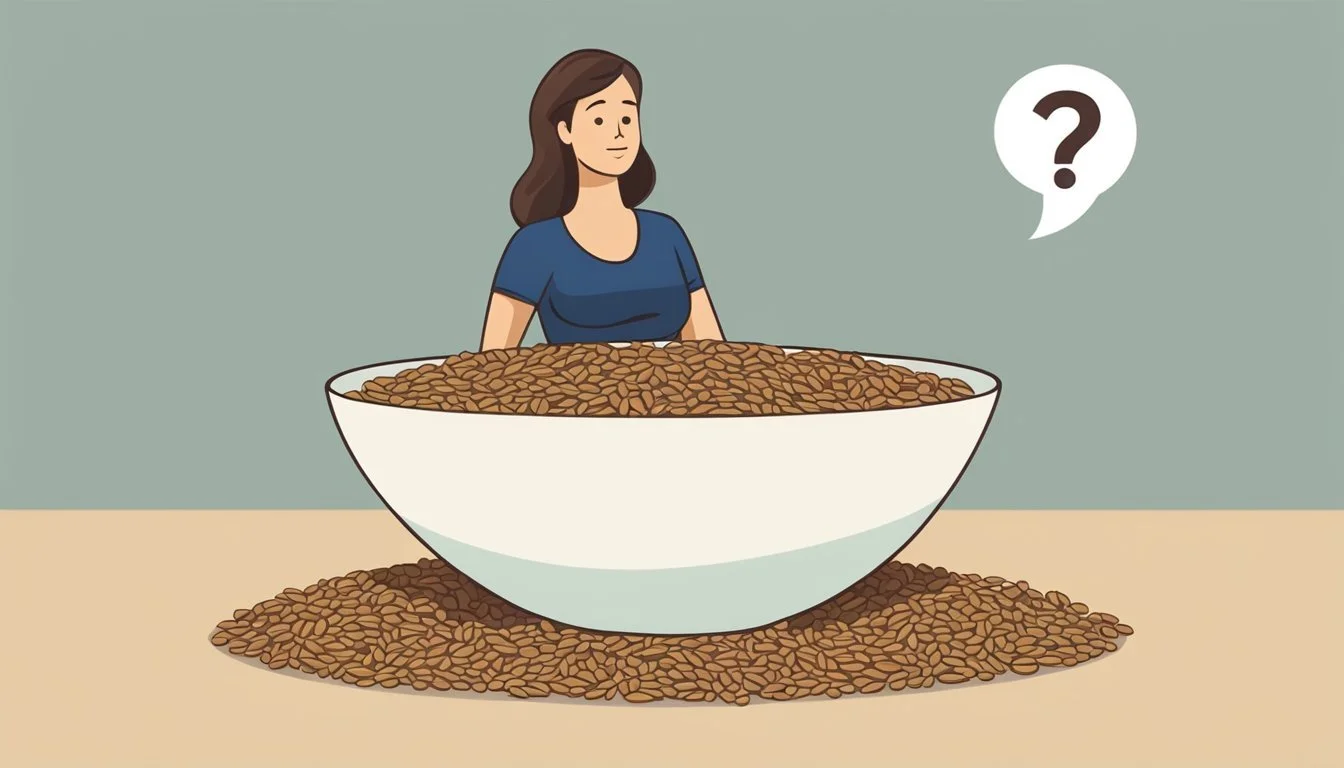Can Pregnant Women Eat Flaxseeds?
Unveiling Nutritional Facts and Myths
Pregnancy brings with it a plethora of dietary considerations, with flaxseeds often surfacing as a subject of discussion. These small seeds are packed with nutrients that are important for health, containing high levels of omega-3 fatty acids, fiber, and lignans, which together support cardiovascular health and may provide a dietary boost for expectant mothers. However, it's essential to balance the potential benefits with understanding the appropriate consumption levels and possible risks during pregnancy.
Nutrition experts acknowledge the positive attributes of flaxseeds, such as their role in regulating blood pressure and reducing inflammation, which are particularly beneficial during pregnancy. Incorporating flaxseeds into meals can be straightforward, with recommendations suggesting that ground flaxseed can be added to smoothies, oatmeal, or baked goods. Nonetheless, it's crucial for pregnant women to be aware that excessive intake of flaxseeds might lead to mild side effects, and there are specific considerations regarding the use of flaxseed oil as the pregnancy progresses.
While flaxseeds can indeed be part of a pregnant woman's diet, moderation is key. As with any dietary choice during pregnancy, it's advisable for individuals to consult healthcare professionals for tailored advice. It is also important to consider existing medical conditions, such as gestational diabetes, which flaxseed has been shown to impact through the reduction of certain markers, a consideration that healthcare providers may take into account when advising their patients.
Nutritional Overview of Flaxseeds
Flaxseeds, also referred to as linseeds, are a nutrient-dense food offering a variety of essential components beneficial to human health. They are highly regarded for their rich content of omega-3 fatty acids, dietary fiber, and a variety of proteins, vitamins, and minerals.
Omega-3 Fatty Acids and ALA Content
Flaxseeds are an excellent source of plant-based omega-3 fatty acids, specifically alpha-linolenic acid (ALA). This essential fatty acid is pivotal for maintaining heart health and is thought to play a role in brain function. One tablespoon of ground flaxseeds contains about 1.8 grams of plant omega-3s, making it a valuable addition to a pregnancy diet where fetal brain development is a priority.
Nutrient Quantity in 1 tbsp of ground flaxseeds ALA 1.8 grams
Fiber and its Digestive Benefits
Dietary fiber in flaxseeds supports digestive health and can help maintain bowel regularity, a common concern during pregnancy. Ground flaxseeds are particularly effective, as they aid in the absorption of nutrients while also contributing to satiety, potentially helping to manage weight gain during pregnancy. A single tablespoon of ground flaxseeds packs approximately 2 grams of dietary fiber.
Proteins, Vitamins, and Minerals
Flaxseeds are notable for their protein content, making them a useful addition to a plant-based diet. They also provide a spectrum of vitamins and minerals, including Vitamin B6, magnesium, zinc, iron, and calcium; all of which are crucial for a growing fetus and the health of the mother. These nutrients support a range of bodily functions from immune response to bone development.
Nutrients Quantity in 1 tbsp of ground flaxseeds Protein 1.3 grams Magnesium 27 mg Zinc 0.3 mg Iron 0.5 mg Calcium 18 mg Vitamin B6 Trace amounts
In terms of nutritional profile, flaxseeds offer an abundance of key components that are essential during pregnancy. They not only provide quality omega-3 fatty acids but are also a source of fiber for digestive health and proteins, vitamins, and minerals for overall well-being.
Health Benefits of Flaxseeds During Pregnancy
Flaxseeds are a nutritional powerhouse that can offer significant health advantages during pregnancy, particularly in the areas of fetal brain development and maternal health. They are a rich source of omega-3 fatty acids, antioxidants, and fiber, making them a beneficial addition to a pregnancy diet when consumed in appropriate amounts.
Support for Brain Development
Flaxseeds contain a high concentration of omega-3 fatty acids, which are crucial for the neurological development of the fetus. These fatty acids are essential building blocks for the brain and retina, supporting the growth of these vital organs. A steady supply of omega-3s from flaxseeds can help ensure that pregnant women are providing their growing babies with the nutrients needed for optimal brain development.
Potential Regulation of Blood Sugar Levels
The fiber content in flaxseeds may help regulate blood sugar levels, which is particularly beneficial for pregnant women with or at risk of gestational diabetes. Dietary fiber slows down the absorption of sugar in the blood, thus helping to maintain more stable glucose levels. Regular consumption of flaxseeds as part of a balanced pregnancy diet may, therefore, contribute to healthier blood sugar regulation.
Effects on Blood Pressure and Cholesterol
Flaxseeds have been associated with potential benefits for both blood pressure and cholesterol levels. The presence of these seeds in a healthy diet can play a role in reducing hypertension, which is a common concern during pregnancy. Furthermore, flaxseeds possess properties that may aid in lowering LDL (bad) cholesterol levels while boosting HDL (good) cholesterol, promoting overall cardiovascular health for pregnant women.
Incorporating Flaxseeds into a Pregnancy Diet
Flaxseeds offer significant health benefits for pregnant women, including being a rich source of omega-3 fatty acids and fiber. When adding flaxseeds to a pregnancy diet, safety and culinary versatility are paramount.
Safe Ways to Eat Flaxseeds
It is generally safe for pregnant women to include flaxseeds in their diet. However, they should consume them in moderate amounts and prefer ground flaxseeds, as they are easier to digest than whole seeds. Flaxseed oil is a convenient alternative for those who dislike the seeds' texture. Expectant mothers should ensure flaxseeds and flaxseed oil are stored properly to preserve their nutrients. It is advised to avoid high amounts to prevent potential side effects, such as gastrointestinal distress.
Recipe Ideas and Suggestions
Incorporating flaxseeds into a pregnancy diet can be both delicious and simple:
Breakfast: Sprinkle ground flaxseeds over cereal, oatmeal, or yogurt; bake them into breads or granola.
Lunch and Dinner: Add to salad dressings or mix into soups; use flaxseed oil as a salad topping.
Snacks: Blend into smoothies or stir into soups for a nutrient boost.
For variety, pregnant women might alternate flaxseeds with other nutrient-rich seeds like chia seeds to enrich their diet.
Safety and Precautionary Measures
When considering the inclusion of flaxseeds in a pregnancy diet, it is crucial to address safety and precautionary measures to mitigate any potential risks to both mother and child.
Moderation is Key
Moderate consumption of flaxseeds is generally regarded as safe during pregnancy. Due to their high content of soluble fiber and omega-3 fatty acids, flaxseeds can be a beneficial addition to the diet. However, it is essential to limit the quantity to avoid potential side effects, as excessive intake may lead to digestive discomfort and other issues. A common guideline is to restrict the intake to one to two tablespoons of ground flaxseed per day.
Potential Risks and Side Effects
The consumption of flaxseeds does carry some risks and potential side effects that pregnant women should be aware of:
Digestive System: Overconsumption can cause digestive issues such as bloating, diarrhea, and constipation due to the laxative effect of the seeds.
Cyanide Compounds: Raw flaxseeds contain cyanogenic glycosides, which can release cyanide when consumed. Therefore, it is safer to consume roasted or cooked flaxseeds to minimize this risk.
Premature Birth: There is some evidence suggesting that flaxseed oil might increase the risk of premature birth if consumed in large amounts during the later stages of pregnancy.
Hormonal Effects: Flaxseeds have phytoestrogenic properties which can have estrogen-like effects in the body, though the exact implications of this during pregnancy are not fully understood.
Interactions with Medication
Flaxseeds may interact with certain medications. They can have a blood-thinning effect and should be used with caution if taking blood thinner medications. Pregnant women are advised to consult with their healthcare provider before including flaxseeds in their diet, especially if they are on medications or have any underlying health conditions. It is always important to consider individual medical conditions and dietary needs when incorporating new foods into a pregnancy diet.
Post-Pregnancy Considerations
After childbirth, a mother’s body requires nutrients to recover and to provide for the newborn through breastfeeding. Flaxseeds, being rich in omega-3s and fiber, can play a significant role in a mother's post-pregnancy nutrition.
Flaxseeds for Lactation and Recovery
Breastfeeding mothers often seek foods that support milk production and overall recovery post-childbirth. Flaxseeds may benefit lactating women due to their omega-3 fatty acids, which are crucial for the development of the infant's nervous system. Studies suggest that these fatty acids, passed from mother to child through breast milk, contribute positively to the baby's brain development. Additionally, the fiber content in flaxseeds can help mothers manage post-pregnancy weight and promote gastrointestinal health.
Key components in flaxseeds beneficial for lactation and recovery:
Omega-3 fatty acids: Essential for baby's brain development.
Dietary fiber: Aids in digestive health and weight management for the mother.
Long-term Health Benefits
Consuming flaxseeds post-pregnancy can also contribute to a mother's long-term health. They contain lignans and fiber, which have been associated with a reduced risk of heart disease. While soluble fiber helps with cholesterol management, insoluble fiber assists in maintaining bowel regularity. Incorporating flaxseeds into one's diet through various means, such as adding them to salads, can be an effective strategy for bolstering nutrition and supporting ongoing weight loss efforts post-pregnancy.
Strategies for including flaxseeds in the diet:
Sprinkle ground flaxseeds over salads, cereals, or yogurts.
Include flaxseeds in baked goods for an added nutritional profile.
By considering these post-pregnancy dietary additions, mothers can support their own health and their infant's development through nutrient-rich breast milk.




